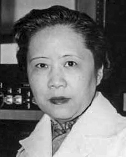

C. S. Wu
Columbia University
May 29, 1912 - February 16, 1997
|
Scientific Discipline: Physics Membership Type:
Member
(elected 1958)
|
Chien-Shiung Wu was an experimental nuclear physicist whose research with the beta decay process and properties of neutrons and other subatomic particles provided data that confirmed theories about what happens with energy and mass when atoms decompose.
Wu received a bachelors degree in physics in 1934. She completed her PhD thesis in 1940 at the University of California, Berkeley, with work that summarized the lifetime and decay properties of two xenon (Xe) isotopes that result from the fission of uranium. When the Hanford nuclear reactor was troubled by periodic shutdowns, Wu helped remedy the problem because of her knowledge of 135Xe.
Wu accepted a teaching position at Smith College, but left soon after because of the lack of research infrastructure there. She taught briefly at Princeton University as the first female member of the faculty before moving to Columbia University to work on the Manhattan Project. She remained at the university as a member of the Department of Physics for the rest of her career.
Wu was honored with membership in scientific societies and numerous awards, including the National Medal of Science, the Wolf Prize, the Research Corporation Award, the John Price Weatherill Medal of the Franklin Institute, the Cyrus B. Comstock Award, and the Tom Bonner Prize of the American Physical Society. Furthermore, she was the first woman to hold a tenured faculty position at Columbia University, the first woman to receive a D. Sc. degree from Princeton University, and the first woman to lead the American Physical Society as its president.

